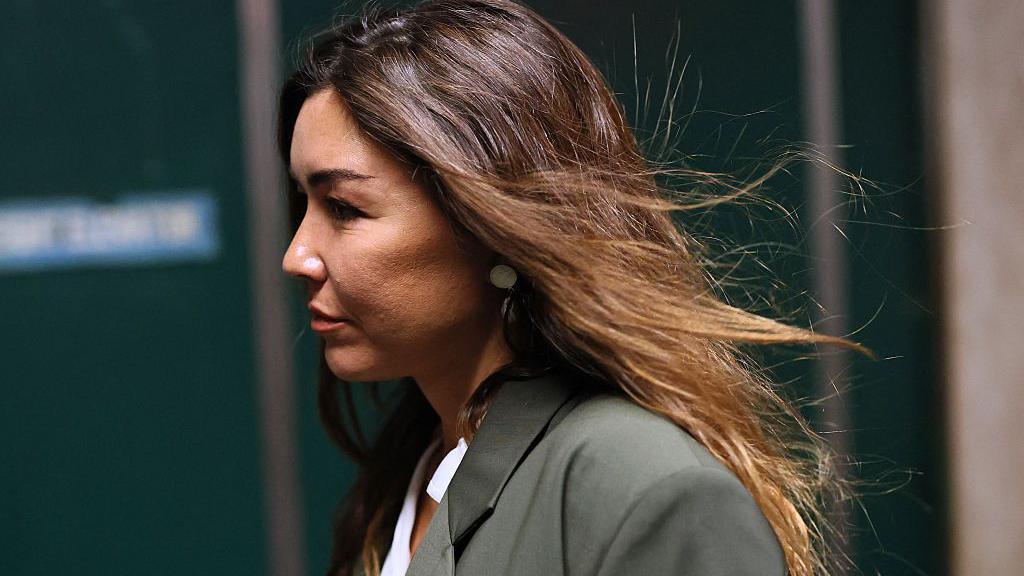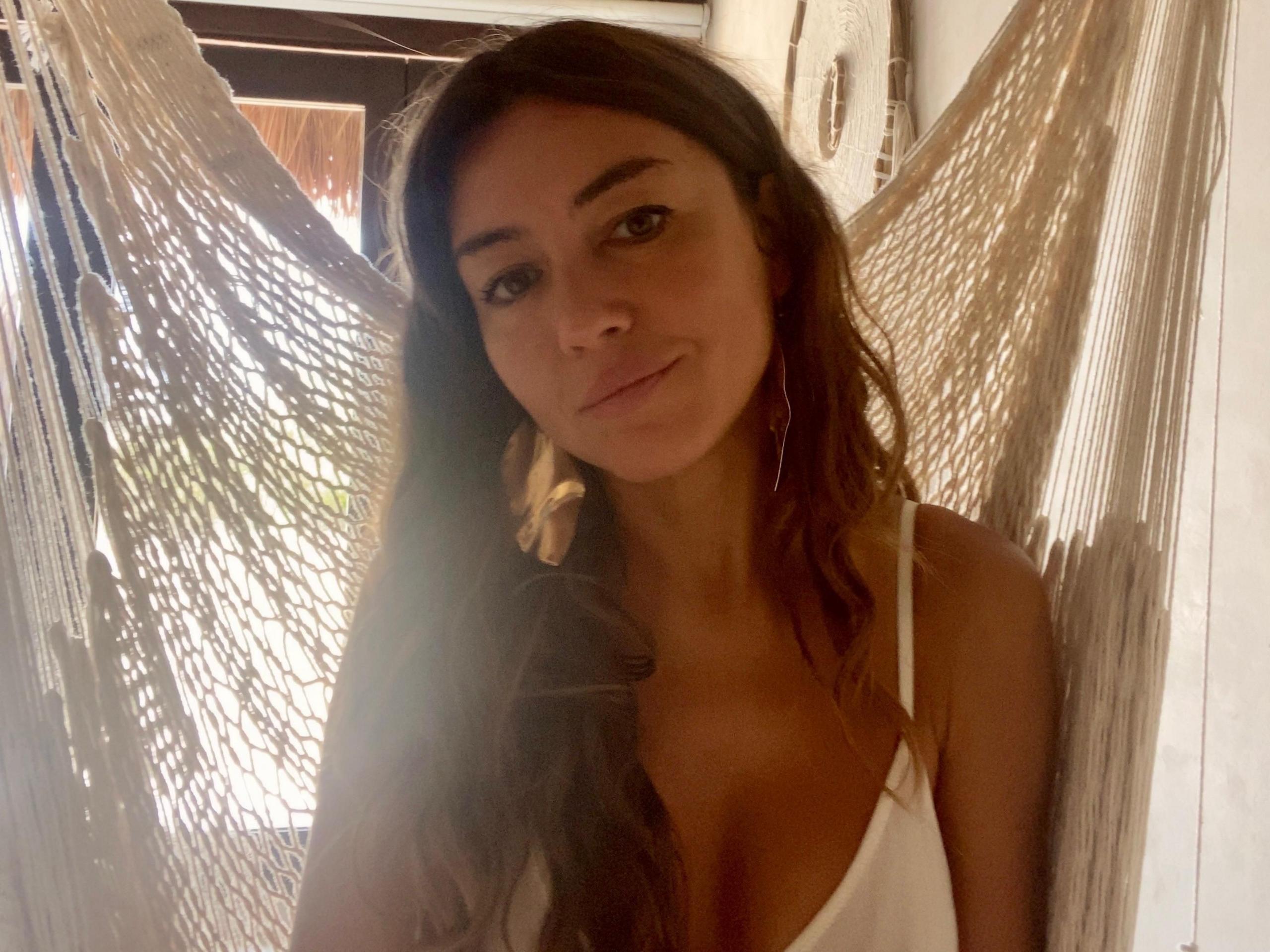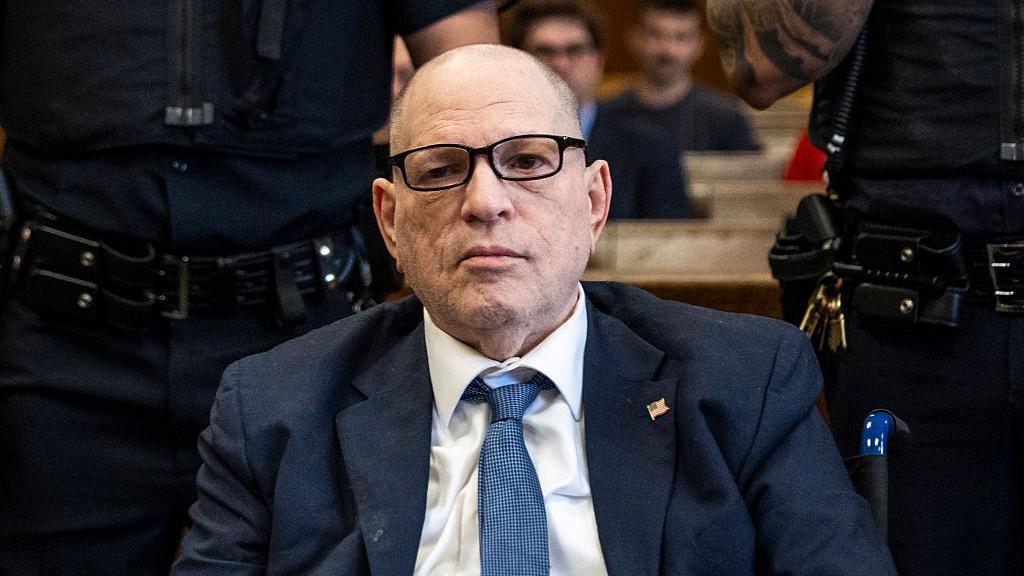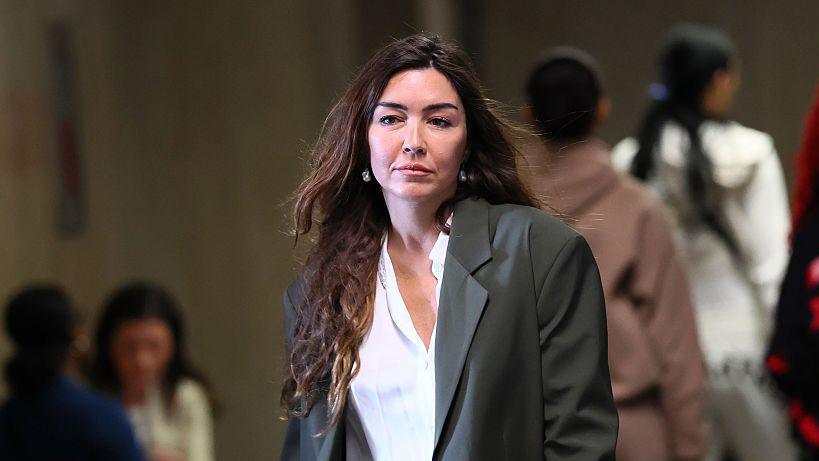'For the sake of truth': A Weinstein victim's decision to take the stand again

Miriam Haley has testified against Weinstein in two New York sex crime trials
- Published
On Wednesday, 12 New York jurors found disgraced film mogul Harvey Weinstein guilty of sexually assaulting Miriam Haley in 2006, after his previous sex crimes conviction in the state was overturned last year.
When Miriam Haley heard the news last year that a New York court had thrown out a rape conviction against Harvey Weinstein, the man she helped put behind bars four years before, she was shocked.
In 2020, Ms Haley told a Manhattan courtroom every detail of the time Weinstein sexually assaulted her in his New York apartment in 2006.
This time, she was planning to turn down prosecutors, not wanting to put herself through it all again. But just weeks before the retrial, she saw a link to a new podcast series aimed at "exonerating" Weinstein.
"I just thought, I have to stand up for myself. I have to stand up for the truth," Ms Haley told the BBC.
She was one of three women to testify against Weinstein during his six-week retrial, accusing him of using his power as a Miramax Hollywood tycoon to sexually abuse young women.
Ultimately, the jury found Weinstein guilty of sexually assaulting only Ms Haley. They acquitted him of sexually assaulting another woman, and a mistrial was declared on a third rape count.
The verdict "gives me hope - hope that there is new awareness around sexual violence and that the myth of the perfect victim is fading", Ms Haley said outside the Manhattan courthouse on Wednesday.
A court of appeals overturned Weinstein's previous conviction for sex crimes in New York last April. The judges found Weinstein's original trial was not fair because it included testimony from women who made allegations beyond the official charges against him.
In September, the 73-year-old was indicted on sexual assault charges for a new trial.
He pleaded not guilty and again vehemently denied the allegations. His lawyers argued at the retrial that his accusers were "friends with benefits" who had consensual sex with him in exchange for work opportunities.
Those portrayals were insulting, said Ms Haley, adding that Weinstein's continued denial of the allegations pushed her to "keep showing up" in court.
Facing Weinstein again
Warning: This article contains distressing content
For this trial, Ms Haley spent four days on the stand - three more than she did the first time.
This trial, she could look straight at her assailant, who sat in a wheelchair next to the defence table, unlike during the first trial, when he was blocked by the judge's booth.
Going in, she worried, as she had in the previous trial, about how she would feel.
"Would I feel intimidated? Would I maybe even feel sorry for him?" she said. "And then when I did see him, it was just like nothing."
With Weinstein watching, Ms Haley told the court about their first meeting in France in 2006. She said she went to his hotel thinking they would discuss work opportunities, but Weinstein asked her to give him a massage. She declined and left in tears.
They remained in contact, and Weinstein later helped Ms Haley find work as a production assistant for the television show Project Runway.
Then, one night she accepted an invitation to his New York apartment, she said, because he had just asked her to attend a movie premiere in Los Angeles.
On that evening of 10 July 2006, the film mogul "lunged" at her from across a couch and kissed her. He pushed her into a bedroom, where he forcibly performed oral sex on her, Ms Haley testified.
"I couldn't get away from his grip," she told the court. "I realised, I'm getting raped, this is what this is."
Recounting those intimate details to a room full of strangers for the second time was "exhausting", Ms Haley later told the BBC.
"It's just so invasive," she said.
An 'offensive' cross-examination
After direct questioning, Ms Haley faced cross-examination from Weinstein attorney Jennifer Bonjean, who is known for her combative style and has defended other major Hollywood figures accused of sexual assault, including Bill Cosby and R Kelly.
When Ms Bonjean grilled her about who removed her clothing on that July evening, Ms Haley answered through tears.
"He took my clothes off…I didn't take my clothes off," she said. "He was the one who raped me, not the other way around."
"That is for the jury to decide," Ms Bonjean replied.
The comment was disrespectful, said Ms Haley, who added that she could "feel my eyes balling up, and everything, just because it was just so deeply offensive in that moment".
"Regardless of the verdict, it still happened, from my perspective," she said. "I'm still the one who has to live with it."
Ms Haley was followed on the stand by actress Jessica Mann, who was involved in Weinstein's first New York trial, and former model Kaja Sokola, who testified for the first time, accusing Weinstein of sexually assaulting her when she was 19.
The jury found Weinstein not guilty of assaulting Ms Sokola, and a mistrial was declared on the rape count brought by Ms Mann, after one juror refused to continue deliberations.
Weinstein still must serve a separate 16-year sentence for sex crimes in California, meaning he was already expected to spend the rest of his life in prison regardless of the retrial's outcome.
In total, he has been accused of sexual misconduct, assault and rape by more than 100 women.

Weinstein’s trials have forced Ms Haley to process Weinstein’s abuse, she says
A 'small victory' in showing up to court
Like many victims of sexual assault, Ms Haley did not come forward publicly about the abuse for years.
She said she adopted a strategy from her difficult childhood - one that included abuse - where she suppressed the traumatic memories and went on with life as usual.
Nonetheless, the assault had emotional consequences.
"I lost confidence in a lot of things," Ms Haley said. "All I could see on the surface was all these people fawning over him. It was extremely humiliating and embarrassing."
Ms Haley eventually decided to come forward after other women accused Weinstein of assault, helping to galvanise the #MeToo movement.
She was sent death threats - but also dozens of messages from women who said she had motivated them to speak out about their own abuse.
"It does have this ripple effect," she said.
Ultimately, the verdict was evidence of the "lasting and real change" around sexual assault awareness, Ms Haley said, calling the conviction a "release".
Now a freelance producer who spends time in Mexico, Ms Haley believes the end of the retrial will close a painful chapter, one she thought was already sealed with Weinstein's first conviction.
"Even me showing up this time feels like a small victory," she said. "I definitely wasn't really doing it for myself. I was doing it for the sake of truth, and for other women."
- Published11 June


